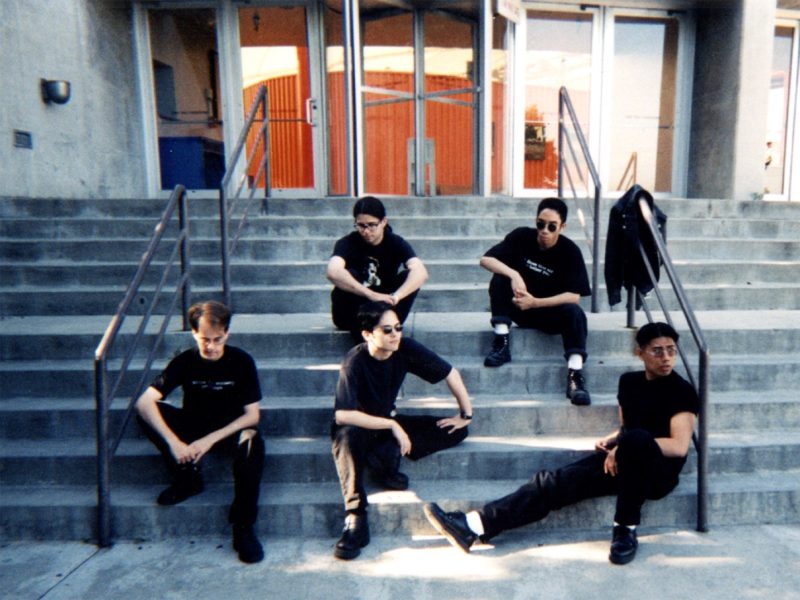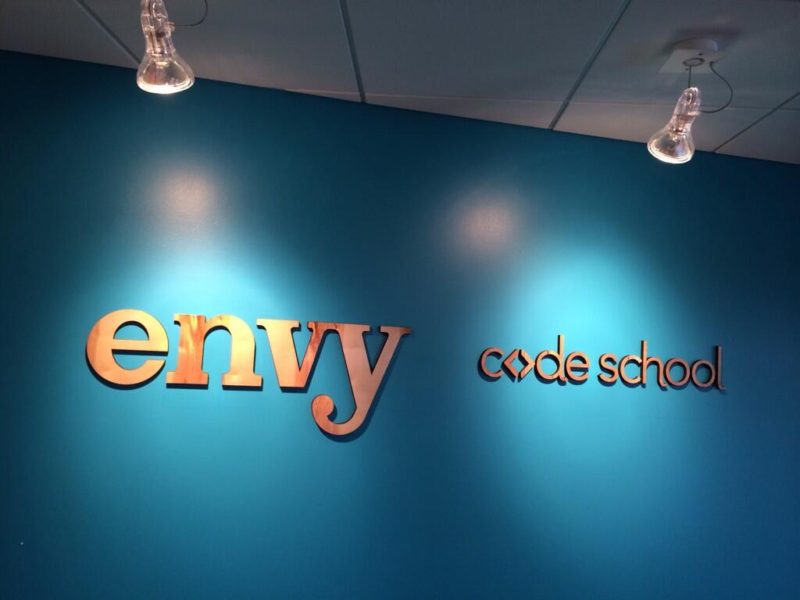In 1997 I was in my first year of college. Instead of the feelings of excitement and anxiety, that were the norm of young students, it was for me a time of loneliness and shame. I felt stigmatized and broken. Little did I know it at the time but these traumatic events would empower me to create the safe and successful culture at Envy Labs and then Code School. I want to show you how one lead to another, with the hope it might help you in your journey.

My Unfortunate Events
Two things happened in my life almost simultaneously; First, I came out to my parents that I had been experimenting with my sexuality, and I was bisexual. Unfortunately, they reacted in a somewhat less than supportive manner, which in turn made me feel ashamed for being who I was. Second, I was confronted by my roommate and Residential Assistant (RA) about something they found on my computer (If we have a beer together sometime, feel free to ask me about it). They jumped to conclusions, treated me like I was a bad person, forced me out of my dorm, and started an avalanche of self-doubt and shame in me. A shame I wasn’t comfortable speaking to anyone about.
In response I retreated into myself, and started wearing a lot of black clothing. At the time if you’d asked me why I’d have told you that it was because I admired the people I found at Goth clubs, they apologized to no one for who they were and how they looked. This would have been a lie.

Yes, that’s me in the middle. No, we weren’t a boy band.
The Underlying Fear
Last year, I took an Authentic Leadership course where I was introduced to the idea that the complexity of an individual can be described by an internal cast of characters. Bear with me, we each have voices in our head, some are positive and some are negative. For example, when I’m passionate about a particular blog post I’ve written it’s my perfectionist voice that tells me, “It could have been better.” or, “You could have made it more exciting, no one is even going to care.”
I learned that by identifying the “traitor voices” that make me feel bad, like the perfectionist voice, I can learn to be more self-aware and quiet them. I can confront the perfectionist and tell him that it’s better to do something imperfectly than nothing flawlessly.
It's better to do something imperfectly, than nothing flawlessly.Click To Tweet During the course I discovered what I refer to as my “victim traitor”. When I’m in social situations, it’s my victim voice that tells me it’s only a matter of time before someone discovers I’m a bad person. It’s only a matter of time before they judge me. When I get rejected by people it’s my victim voice that tells me that I’m broken and unlovable.
During the course I discovered what I refer to as my “victim traitor”. When I’m in social situations, it’s my victim voice that tells me it’s only a matter of time before someone discovers I’m a bad person. It’s only a matter of time before they judge me. When I get rejected by people it’s my victim voice that tells me that I’m broken and unlovable.
In college, my victim traitor had a loud voice. The black clothing was a defense mechanism. If I dressed in a way that showed I was broken and different I was robbing people of the chance to pass judgment on me. If I advertise my defects in my clothing then I won’t have to feel rejected when people discover how broken I am.
Stronger in Numbers
Despite all this, I managed to graduate with a Computer Engineering degree thanks to three important factors. First was joining GALA, the GLBTQ group on campus where I surrounded myself with others who also (sometimes) felt persecuted. I was comforted by being among people who I could trust to be open-minded, safe, and non-judgemental.
The second was the San Francisco Bay area goth scene. Every Monday, Wednesday, and often Saturday night I would put on my best black velvet and vinyl and dance my ass off at the local clubs. At the clubs I felt like I was surrounded by other outcasts. I felt like I belonged and I would often get kind words about my outfits and makeup. To this day one corner of my closet is all black, and I still enjoy dancing at goth clubs in Florida.
The third was performing as Frank-N-Furter in the Rocky Horror Picture Show. Every other Saturday night my Junior year I would strut my stuff on a stage in downtown San Jose, in front of 100+ people. The acceptance and positive energy I received from performing boosted my self-esteem. I performed for a good four years with the Bawdy Caste in San Jose, which still exists today.
Performing lead me to petition my parents to stay in school an extra year to minor in Theatre before I graduated. Thankfully my parents supported me in this.

Starting Envy Labs
Envy Labs, the web development consultancy, began in 2009 with one email to a few developers I respected. It had this question:
“What would be your optimal work environment?”
I’d had four different full-time jobs after college and I knew that none of them had an optimal work environment. Many of my friends also reported working for companies where they were overworked and undervalued. So a few of those friends and I got together and created Envy Labs, which is now known as Made with Envy.
What we did differently from the start at Envy Labs:
- We paid for every hour an employee worked, unlike most overworked salaried positions.
- We set aside time for education.
- We went to conferences as a team.
- We encouraged participation in the wider tech community.
- We socialized outside of work.
- We listened to each other and made decisions as a team.
One of our core values at Envy was “Practice Transparency.” To me that meant being completely open with everyone about what we’re doing and how we’re doing it. Every Monday morning we would stand before the team and give updates on each phase of our projects. This was just one of many ways we built trust through transparency.
I also held monthly 1 on 1 meetings with everyone on the team, especially as we got bigger, to ensure that everyone felt they were being listened to. I was always afraid that I’d discover that someone was unhappy with the company and wanted to leave, so I kept a close eye on everyone to make sure they enjoyed their time at Envy.
More than anything, I cared a lot about creating a safe and positive space. A space where people could be themselves and know they were valued. A space where they weren’t afraid of being judged unfairly, as I had been in the past.
There’s likely more I could have done. Hah! There’s that perfectionist voice again.
Traitors Can Become Allies
Another idea that came from my leadership workshop was that traitor voices can also become ally voices. The same victim voice that makes me worry you’re going to reject me, is also the ally voice who wants to create spaces where people can be themselves without fear of judgment. It’s the same voice that says “You should probably speak to Tim today, he seemed a little off in that meeting.” or “I need to talk to Joe and Jim individually because I can tell they’ve lost respect for each other.”
It’s that voice that tells me to put people ahead of other business priorities. People come first, and my fourth founder’s talk goes into all sorts of ways we’ve done this at Code School.
Reframing the Event
It wasn’t until after the leadership seminar a year ago that I started telling more people about my college story. By god it wasn’t easy, but when it was met with true empathy and compassion I healed a little inside. It helped me reframe the story.
Instead of being a series of tragic events that left me feeling ashamed, I can see it as a series of unfortunate events that I had the strength to overcome. I sought out support when I needed it, and I still managed to graduate. These experiences made me strong.
It was also these experiences that empowered me to create the winning work cultures at Envy Labs and Code School. It was this strength that helped me put people first and create a safe work environment where people can be creative and do their best work.
Every story about your failure and rejection has an alternate version filled with strength and resilience begging to be re-told. You have the power to reshape the story in your mind, and make it a survival story instead of a story of defeat.
Every failure story in your life has an alternate version full of strength begging to be re-toldClick To TweetIf you have a similar story about how shame led to strength which helped you succeed, I’d love to hear about them in the comments.

A Special Thanks
Just over a year before I left Code School, as the company was approaching 50 employees, we made an amazing hire. Sarah Doss became the first person in our new Human Resources department.
One of the first things she did was do 1 on 1 meetings with everyone. It quickly became apparent that she had a magnificent talent for listening to people. People opened up to her and felt safe going to her when something wasn’t right or no one else was listening. She sat in on meetings to help determine what would make them function better and helped us keep an eye on morale.
It was so gratifying to find someone who cared as much as I do about creating a safe work environment. Without her it would have been much harder to move on from Code School. She’s my ally there now, nurturing the culture and keeping the space safe and judgement free.
Thank you Sarah.
P.S. My parents have since apologized and made amends for how they responded to the situation when I was in college. ?






Thanks for sharing this Gregg. Who would have thought a successful tech entrepreneur would have had the struggles you mentioned during college? I love when people open up about these parts of their lives, because it helps everyone else feel normal.
Great post Gregg and thanks for sharing. You’re an amazing human being and I owe pretty much everything I know about a healthy company culture from you and your actions. Thank you and I look forward to all the awesome things you’ll do over the coming years. #nopressure Cheers.
Thanks for the kind words Mark, really appreciate it.
I dealt with a lot of emotional trauma at a young age, including poverty, abuse, and a broken home. I was the first member of my family to attend college, and all the way through I never felt like I was good enough. It’s hard to develop a sense of self when your life is so chaotic.
I worked my way through college, scraping to get by, and by the time I got out I was a fighter. I dealt with the shame- of being poor, not having a family foundation, having a late start in education and in my career- by always looking for challenges. Testing my mettle, my values, my skills.
In many ways it helped me as I started a career. I dared anyone to tell me that I couldn’t figure it out. I usually did. And many of the challenges I created for myself made me a better person, a better listener, a better teammate. Of course, sometimes they got me into trouble. But I’ve learned from that, too.
I progressed faster than I might have otherwise, running a small company within three years of leaving college. Eventually I ran into a lot of smart people who pushed me even further than I was able to push myself and showed me the sort of person I wanted to be.
You have been one of those people, and it’s nice to read about your personal story and identify with some of your challenges. Thanks. I hope that when I’m ready to start my own company I can create the kind of inclusive, welcoming environment you were able to foster at Envy Labs and Code School.
P.S. Sorry for the anonymity. Hopefully one day I’ll feel more comfortable about sharing my story.
Thanks for sharing Anon. That is great story of strength. =)
Gregg , fantastic post! I’m enjoying your writing here. You mentioned earlier how you would beam knowledge to us if you could, and I’ve always been in awe of your ability to do just that, going back to the Ruby and Barcamp days. But this article takes it to the next level. Thanks for sharing such a personal story, it will help and inspire so many people. Next time we have that beer you mentioned, I’ll tell you about the time unknowingly wandered into one of those Goth clubs on a Monday night in SF.
Thanks for the comment Mike. Let’s get that beer. =)
Great post Gregg. Inspiring and authentic. Please keep up your great work.
Thanks Greg. Really inspiring. While I am *generally* pretty happy with myself I wish I could say I had a success story like yours, but I’m still very hopeful I’ll get there. You asked for people’s experience in the comments, so: I did a couple of liberal arts degrees at university instead of the Computer Science one I really wanted to do because I was told my maths wasn’t strong enough, then went into tech support… Unfortunately, after an ok beginning the first-line support industry in the UK become more and more targets focused, to the point where employees were constantly becoming mentally and physically ill from stress. Even though in the beginning I had come close to enjoying my job, and many of my friends said the same, slowly the environment changed, I can only assume as the pressure of competition and perhaps buyouts by ‘bigger-fish’ took their toll…….
After trying to improve these workplaces: first by talking to sympathetic management in my immediate office environment (which sort of worked for a while, until someone a little higher up overruled in the interests of ever increasing stock values), to forming unions, to suggesting new methods of working that I thought would be more pleasant for myself and my co-workers — without sacrificing productivity, to in the end messing up systems by causing rank confusion (one day I just sat on the Computer Science Corporation intranet system telling all the wrong departments to get in touch with each other over issues that had absolutely nothing to do with them… those sorts of things) in the hopes of drawing attention to working conditions, and writing emails saying things like:
“There is efficiency and then there is the battery farming of human labour and this is very clearly the latter.”
After a company took away the 10 seconds we had between calls to prepare and recoup, because they believed it to be inefficient. As you might imagine, the email did not go down well.
After doing this in two or three different tech support positions (all utilising the same ideological structures for goal setting and structure, at there was basically one ethos comment to the entire industry by that point) I found myself basically unemployable. After a while of casting around for what to do I decided I needed to learn computer coding, and to do what I’d always wanted to do, which is write computer code and create something really different…
Which brings me to the point I’m at now. I have spent just over a year learning to code properly and put in a huge amount of hard work and effort, but without a relevant degree or work history things have been tough going, to say the least. I have my own little company and am making a web social/role playing game which I (perhaps less than humbly) believe has the potential to change the way people see the gaming and social media. I still have a lot of anger about the journey I feel like I have been forced to take and I think things should be a lot lot better for the average employee, particularly within tech as I’ve experienced it. I have next to no money but I still 100% believe that, despite what others often tell me, if I work hard enough for long enough, and remain creative and resourceful in dealing with the problems I encounter (“why don’t you just hire a graphic designer and get all the graphics and stuff done properly so you can focus on the coding… *facepalm*!”) I’ll be able to keep afloat for long enough to see my vision realised, and to get to the point where I can be financially comfortable again, instead of scraping around for cash from here there and everywhere.
That might seem like a depressing story but I really don’t think it is, because the flip side is that I feel inspired every day that I’m still going, that I’m still able to work on my project and make the space to live while I’m doing it. And blogs like this, honest blogs with real details of the personal struggles of people who have managed to do something worth doing, are really really helpful to me when I’m trying to keep a positive attitude.
Peter, really appreciate you sharing your story. Glad you found your way out of tech support and you’re working on things you’re passionate about. =)
A year after Starter Studio, I keep learning from you Gregg. Thanks for being so vocal about the right ways to nurture and grow ideas, startups, and communities. And thanks for all the support you’ve given our startup – and the many others grown with love here.
Looking forward to more learning! 🙂
People who have never experienced any form of hardship will never succeed. That is a fact pertaining to the human condition.
Thank you for sharing, Greg. Brené Brown’s research on shame has been very helpful to me. I recommend her Ted talks (https://www.ted.com/speakers/brene_brown) and her books–in particular, The Gifts of Imperfection.
Yes! I love Brene and her work on shame. Great stuff.
Thanks for sharing Gregg. Its clear to see the reasons why you are succesfull. You covered many things I pursue while leading my small business. I also believe in running the company the right way or not running one at all. Transparency, and treating employees with kindness and looking out for their well being are important factors to me. I think more importantly though are two qualities you mentioned in “humility and self-awareness” or being honest with yourself. Caring for the client and looking out for their best interest.
Ive listened to alot of your podcast and find them very interesting. Even though my business and yours are entirely different I feel you give alot of sound advice not just stuff that someone doing a startup needs to know but anyone in general. Keep it up!
Thanks for sharing something so deeply personal, Gregg. You continue to be an inspiration to me as a great leader and a selfless person. Thank you for all that you continue to do for the Orlando tech community, and keep spreading your message that our work environments can be so much better than they are now.
I’ve come across your blog and CodeSchool fairly late and just wanted to say thank you for both this entry and CS. I just quit what has been the most toxic job of my life. I’ve been a geophysicist in the oil and gas industry (or rather, I was) for a decade. I was working for a company similar to those mentioned in this post in that I was overworked, undervalued and effectively forced to do a huge amount of unpaid overtime that has negatively affected all aspects of my life. I managed to stick it out for 2 years in total, over 1.5 years of which was awful, until a few weeks ago when I realised I just couldn’t do it anymore. I was burned out, stressed and depressed and ultimately decided that no job was worth all that.
One of the things that gave me the courage to quit my job was CS’s courses. I was one of the people you mentioned in your first Founder’s video in that I signed up for it but took the free courses before the weekend had begun and ultimately got a paid subscription before the free weekend had even started! I’ve worked through a lot of them and I’ve started my own projects based on what I’ve learned. While I have no idea if there’s a future for me in coding/dev, it’s at least given me hope that there’s something better out there for me and that I don’t have to stay in a bad situation. Hearing your thoughts on how you run your company also made me realise that there are actually people who believe you can have a successful company AND happy employees and that they’re not mutually exclusive ideas.
Good luck with your future career outside of CodeSchool!
This is really powerful stuff. I had no idea you went through anything like this, as anytime I’ve seen you (conferences, online, etc) you’ve always seemed really upbeat. That’s a testament to the kind of person you are. I’m glad you overcame that hardship to become who you are today.